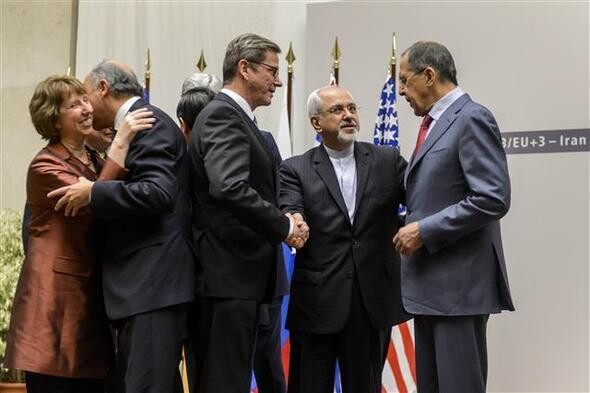hankyoreh
Links to other country sites 다른 나라 사이트 링크
Iran nuclear deal raises question of how to deal with N. Korean nukes

By Kim Kyu-won, staff reporter
Iran’s deal on its nuclear program is turning attention to another country in a similar situation: North Korea.
As meetings between top representatives of the countries in the six-party talks pick up, the question now is whether the talks will resume. Experts said that for all the attention the Iran deal was likely to draw to the talks, the chances of actually affecting their resumption is slim.
Experts said the Iran deal could help spark a resumption of the six-party talks, which have been on ice for the past five years.
“The outcome of these talks can give North Korea a sense of what the US wants, and now the US can focus its attention on North Korea now that the Iran issue is solved,” said Moon Chung-in, a professor at Yonsei University. “In that sense, it offers a sort of guideline for the six-party talks.”
Inje University professor Kim Yeon-chul agreed. “It’s positive because it gives Barack Obama confidence that nuclear problems can be solved through negotiation,” he said. “In particular, it could bring about a change in the US administration’s relatively apathetic attitude toward the North Korean nuclear program.”
The implication is that the solution in Iran could move the North Korean nuclear issue up in importance.
But few experts agreed that a resumption of the six-party talks was likely to come soon. The main reason for the skepticism was the North Korea issue’s low priority in Washington’s East Asia strategy. Paik Hak-soon, a senior researcher at the Sejong Institute, noted that the focus of this strategy is on China, with missile defense as its key element. “South Korea’s participation on missile defense is far more important to the US right now than North Korean denuclearization,” Paik said. “There doesn’t seem to be any reason to rush with the six-party talks.”
Some analysts suggested the North Korean nuclear program isn’t necessarily a serious problem for Washington’s East Asia strategy.
Jeong Se-hyun, president of Wonkwang University and a former Minister of Unification, said that from the US’s standpoint, the nuclear program is “good leverage,” since it places pressure on Beijing and Pyongyang while guaranteeing allegiance from Seoul and Tokyo.
“It’s similar to the way the US is demanding preliminary steps from North Korea for the six-party talks without attempting to pursue negotiation itself,” Jeong said.
The passive approach of President Park Geun-hye and her administration was also cited a factor working against a reopening of the talks. “The South Korean government just keeps parroting the US’s argument that the six-party talks can’t happen without preliminary steps [by North Korea toward denuclearization],” said Moon. “They keep talking about solving the North Korean nuclear issue, but they don’t really seem to have any intention of doing it.”
Jeong agreed. “The South Korean government needs to take action in solving things, whether it‘s inter-Korean relations or the six-party talks, but all they do is look to Washington,” he said. “The forecast for inter-Korean relations and the talks looks bleak as long as this administration is in power.”
Meanwhile, the South Korean Ministry of Foreign Affairs reaffirmed its position that the talks cannot resume without “sincere preliminary steps” from North Korea.
“This deal is not yet final, but it is significant as a dialogue-based solution,” ministry spokesman Cho Tae-young said of the Iran deal on Nov. 24.
“We intend to have dialogue for real progress on the North Korean nuclear issue once certain conditions are met,” Cho added, reaffirming South Korea’s position that steps toward denuclearization from Pyongyang must come before the talks can be resumed.
Please direct questions or comments to [english@hani.co.kr]

Editorial・opinion
![[Column] Park Geun-hye déjà vu in Yoon Suk-yeol [Column] Park Geun-hye déjà vu in Yoon Suk-yeol](https://flexible.img.hani.co.kr/flexible/normal/500/300/imgdb/original/2024/0424/651713945113788.jpg) [Column] Park Geun-hye déjà vu in Yoon Suk-yeol
[Column] Park Geun-hye déjà vu in Yoon Suk-yeol![[Editorial] New weight of N. Korea’s nuclear threats makes dialogue all the more urgent [Editorial] New weight of N. Korea’s nuclear threats makes dialogue all the more urgent](https://flexible.img.hani.co.kr/flexible/normal/500/300/imgdb/original/2024/0424/7317139454662664.jpg) [Editorial] New weight of N. Korea’s nuclear threats makes dialogue all the more urgent
[Editorial] New weight of N. Korea’s nuclear threats makes dialogue all the more urgent- [Guest essay] The real reason Korea’s new right wants to dub Rhee a founding father
- [Column] ‘Choson’: Is it time we start referring to N. Korea in its own terms?
- [Editorial] Japan’s rewriting of history with Korea has gone too far
- [Column] The president’s questionable capacity for dialogue
- [Column] Are chaebol firms just pizza pies for families to divvy up as they please?
- [Column] Has Korea, too, crossed the Rubicon on China?
- [Correspondent’s column] In Japan’s alliance with US, echoes of its past alliances with UK
- [Editorial] Does Yoon think the Korean public is wrong?
Most viewed articles
- 1‘We must say no’: Seoul defense chief on Korean, USFK involvement in hypothetical Taiwan crisis
- 2Will NewJeans end up collateral damage in internal feud at K-pop juggernaut Hybe?
- 3[Column] Park Geun-hye déjà vu in Yoon Suk-yeol
- 4Why Korea shouldn’t welcome Japan’s newly beefed up defense cooperation with US
- 5Thursday to mark start of resignations by senior doctors amid standoff with government
- 6N. Korean hackers breached 10 defense contractors in South for months, police say
- 7[Guest essay] The real reason Korea’s new right wants to dub Rhee a founding father
- 8[Column] ‘Choson’: Is it time we start referring to N. Korea in its own terms?
- 9Kim Jong-un expressed ‘satisfaction’ with nuclear counterstrike drill directed at South
- 10[Editorial] New weight of N. Korea’s nuclear threats makes dialogue all the more urgent